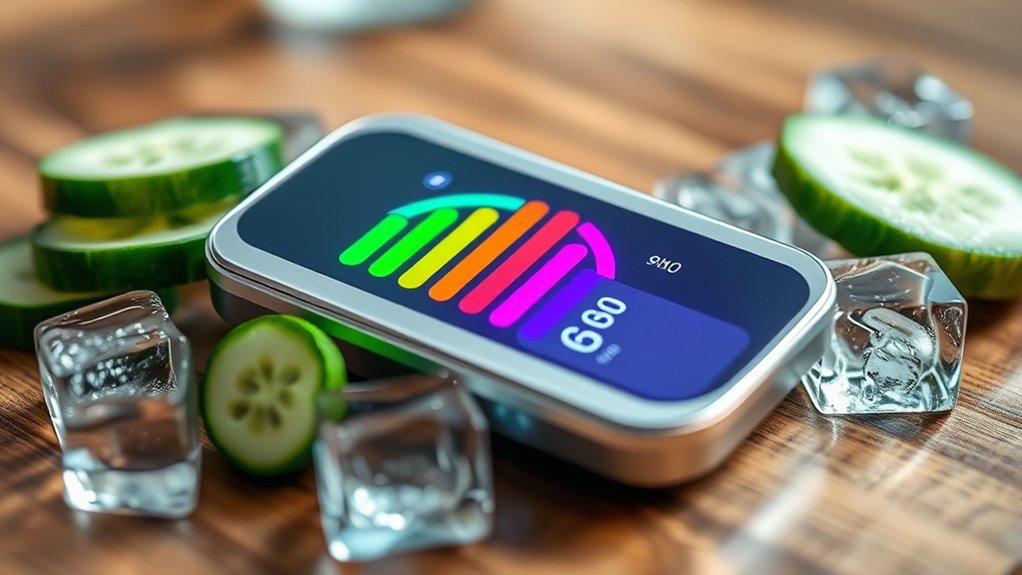Hydration level calculators assess your status by analyzing personal data like body weight, activity, and environment to measure fluid and electrolyte balance. They focus on factors like water intake, electrolyte levels, and urine indicators to determine if you’re properly hydrated. To improve, drink steady amounts of water, eat hydrating foods, and track your intake. Avoid relying only on thirst or overhydrating with sugary drinks. Keep these tips in mind to stay balanced—more helpful insights follow.
Key Takeaways
- Hydration calculators assess individual factors like weight, activity, and environment to provide personalized hydration insights.
- They measure fluid intake and electrolyte levels to determine hydration status accurately.
- Do focus on consistent water consumption and hydrating foods; avoid relying solely on thirst or urine color.
- Not that you should ignore environmental conditions or overhydrate, which can lead to health risks.
- Use advanced AI tools for precise monitoring and tailored recommendations to maintain optimal hydration levels.
How Hydration Level Calculators Determine Your Status
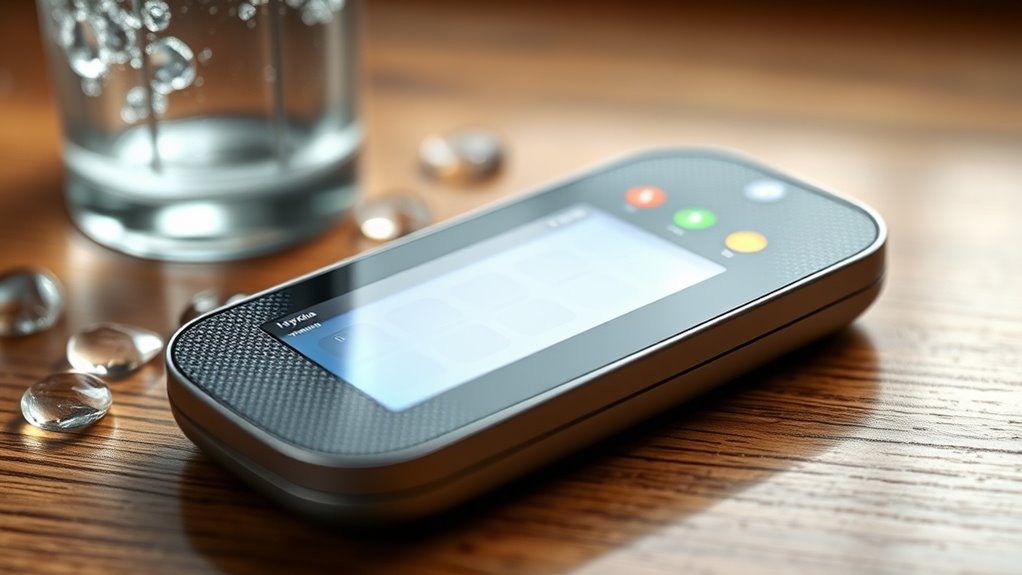
Hydration level calculators determine your status by analyzing various personal data points to assess your body’s fluid balance. Many hydration myths suggest you need to drink a specific amount of water daily, but these myths overlook individual needs. These calculators gather data like body weight, activity level, and environmental factors to provide a tailored hydration assessment. By doing so, they dispel common hydration myths, showing that hydration isn’t a one-size-fits-all approach. Instead, your hydration status depends on personalized factors that influence fluid requirements. The calculators use these insights to give you a clear picture of whether you’re properly hydrated or need to adjust your intake. This personalized approach helps you avoid misconceptions and guarantees you stay ideally hydrated based on your unique body and lifestyle. Additionally, understanding how air quality impacts hydration can further optimize your health and well-being.
Key Factors Measured by Hydration Calculators

Hydration calculators focus on two main factors: your fluid intake balance and electrolyte levels. These measurements help determine if you’re properly hydrated or at risk of dehydration. Understanding these key points allows you to manage your hydration more effectively. Additionally, some advanced calculators may incorporate environmental conditions and physical activity levels to provide a more comprehensive assessment for accurate hydration evaluation.
Fluid Intake Balance
Understanding your fluid intake balance is essential for maintaining proper hydration levels. Hydration calculators assess this balance by examining how much fluid you consume versus how much you lose. When your intake matches your output, your electrolyte balance stays stable, preventing dehydration or overhydration. Urine concentration is a key indicator here; darker, more concentrated urine suggests you need to increase hydration, while clear urine indicates adequate fluid levels. Proper fluid intake ensures your body can maintain crucial functions and supports overall health. Tracking how much you drink helps you identify patterns and adjust accordingly. Maintaining a balanced fluid intake prevents strain on your kidneys and other organs, keeping your hydration levels ideal and your body functioning smoothly. Automation’s role in business intelligence can further optimize how you monitor and interpret this data.
Electrolyte Levels
Electrolyte levels are essential indicators measured by hydration calculators to assess your body’s fluid and mineral balance. Maintaining proper electrolyte balance is vital for muscle function, nerve signaling, and hydration. Imbalances can lead to cramps, fatigue, or dehydration. Hydration supplements often contain key electrolytes like sodium, potassium, magnesium, and calcium to restore balance. When using a hydration calculator, you’ll find that monitoring these levels helps you optimize fluid intake and prevent deficiencies. Here’s a quick overview:
| Electrolyte | Function |
|---|---|
| Sodium | Regulates fluid balance |
| Potassium | Supports muscle function |
| Magnesium | Aids nerve and muscle health |
| Calcium | Strengthens bones and nerves |
Knowing your electrolyte levels guides you to make better hydration choices and avoid disruptions in electrolyte balance. Electrolyte balance is crucial for overall health and performance.
Interpreting Your Hydration Results
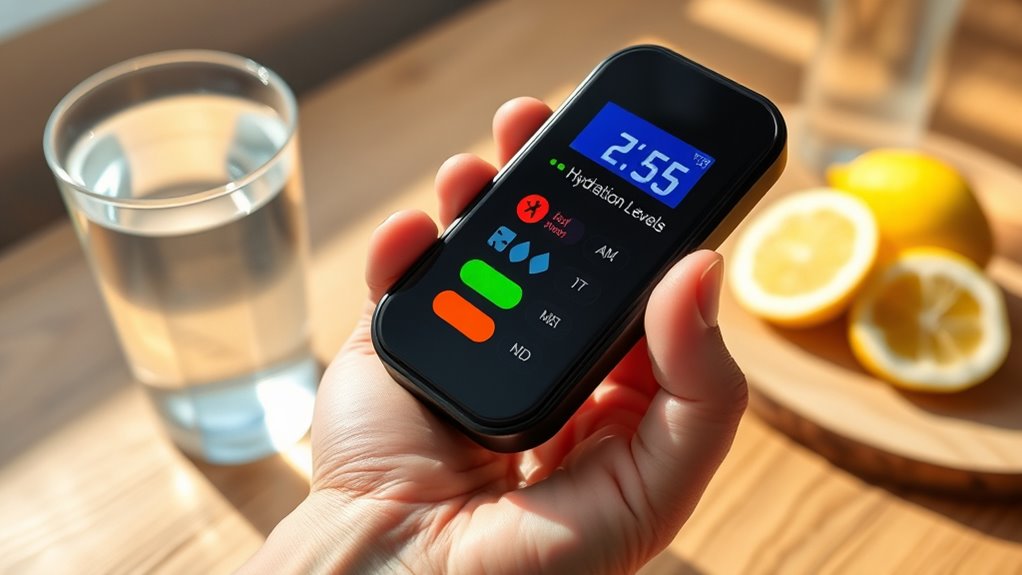
When you review your hydration test results, it’s important to know what the numbers mean for your health. Many people fall for hydration myths, thinking certain symptoms always indicate dehydration, but that’s not always true. Your results can show if you’re properly hydrated or if you need to adjust your fluid intake. Look for signs like low hydration levels, which might correlate with dehydration symptoms such as fatigue, dizziness, or dry skin. Conversely, high hydration levels could suggest overhydration, which also carries risks. Understanding what your numbers mean helps you avoid misconceptions and better interpret how your body is responding to your hydration habits. Remember, hydration isn’t just about drinking water; it’s about maintaining a balanced fluid level for ideal health. AI-powered tools can assist in analyzing your hydration data for more precise insights.
Do This: Actions to Improve Your Hydration
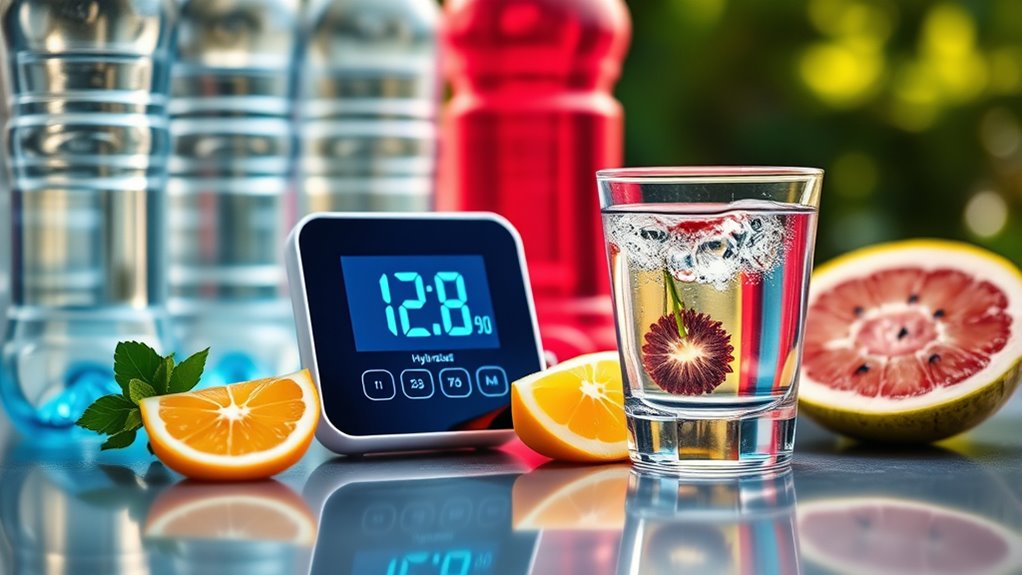
To improve your hydration, start by drinking more water throughout the day. Incorporating hydrating foods like fruits and vegetables can also boost your fluid levels naturally. Making these simple adjustments helps keep you properly hydrated and feeling your best. Additionally, choosing nutrient-rich juice cleanses can support your overall wellness and further enhance hydration.
Increase Water Intake
Boosting your water intake is one of the simplest and most effective ways to improve your hydration levels. When you drink enough fluids, you support your electrolyte balance, which is essential for proper nerve function and muscle contractions. Prioritize regular fluid consumption throughout the day, aiming for consistent sips rather than large amounts at once. Keep a water bottle nearby to remind yourself to drink often. If you’re active or in hot weather, increase your intake accordingly to replace lost fluids. Avoid sugary drinks, which can dehydrate you further. Proper hydration isn’t just about quantity; it’s about maintaining a steady fluid intake to support your overall health and energy. Staying aware of your tuning needs can help optimize your body’s performance and prevent dehydration. Making this a habit helps ensure your body stays well-hydrated and functioning at its best.
Eat Hydrating Foods
In addition to increasing your water intake, filling your diet with hydrating foods can considerably enhance your hydration levels. Fruits like watermelon, oranges, and strawberries provide excellent fruit hydration, delivering both water and essential nutrients. Vegetables such as cucumbers, lettuce, and celery also offer significant vegetable benefits, contributing to your overall fluid intake. These foods are naturally high in water content, making them a smart choice for staying hydrated throughout the day. Eating hydrating foods not only boosts fluid levels but also supplies vitamins, minerals, and fiber that support your health. Incorporating a variety of these options into your meals ensures you stay well-hydrated, especially when you’re active or in hot weather. This simple step can make a noticeable difference in your hydration levels and can be complemented by selecting natural materials that enhance your overall well-being.
Not That: Common Mistakes to Avoid
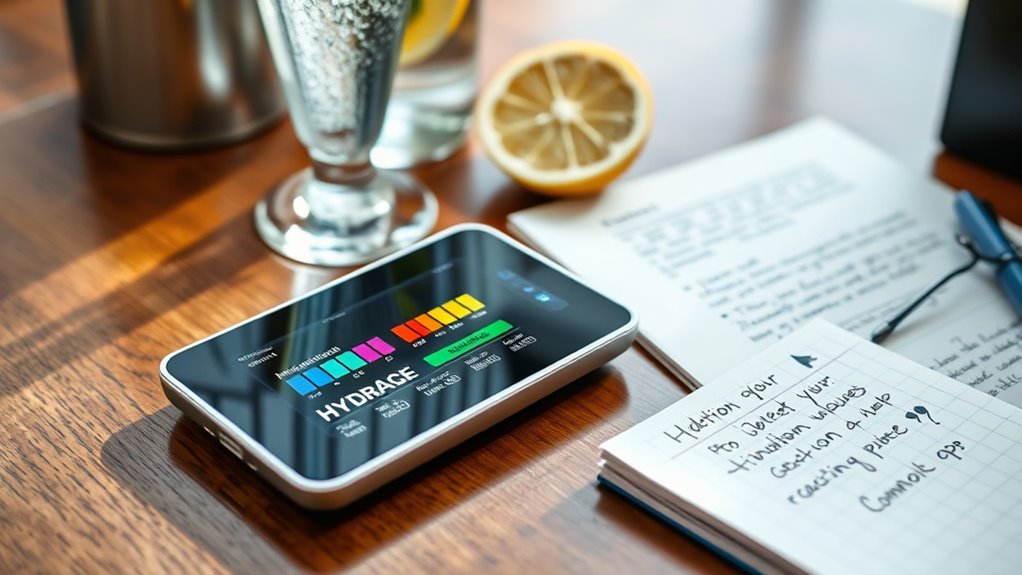
Many people make simple hydration mistakes that can undermine their efforts. Believing dehydration myths, like needing to drink tons of water daily regardless of activity level, can lead to overhydration or neglecting actual thirst cues. Avoid relying solely on memory; use hydration tracking tools to monitor your intake accurately. Skipping water during busy days or only drinking when thirsty might cause dehydration, especially if you’re active or in hot environments. Don’t assume that clear urine always signals proper hydration—other factors can influence urine color. Also, avoid consuming excessive caffeine or alcohol, which can dehydrate you. Being aware of these common pitfalls helps ensure you stay properly hydrated without falling into these traps. Focus on consistent, mindful hydration to support your health goals. Additionally, advancements in AI technology are increasingly being integrated into health monitoring devices to provide more personalized hydration recommendations.
Tips for Maintaining Optimal Hydration Throughout the Day
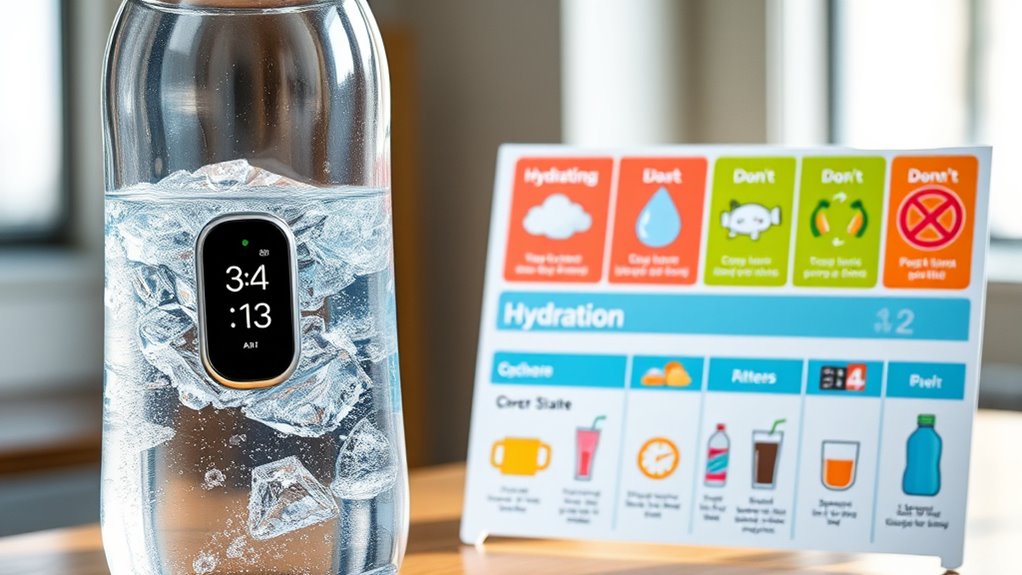
To maintain ideal hydration throughout the day, you need to develop consistent habits that support regular fluid intake. Start your day with a glass of water and sip steadily, especially if you’ve heard hydration myths suggesting you only need water during workouts. Recognize dehydration symptoms like dry mouth, fatigue, or dark urine, so you can respond promptly. Carry a reusable water bottle to remind yourself to drink frequently. Balance your intake with hydrating foods like fruits and vegetables. Avoid waiting until you’re extremely thirsty, as this is a sign you’re already dehydrated. Staying proactive helps prevent dehydration symptoms and keeps your energy levels steady. Incorporating protective styling benefits such as using crochet techniques can also support your overall hair health while maintaining good hydration habits. Remember, consistent hydration is key to feeling your best all day long.
Frequently Asked Questions
How Often Should I Retake the Hydration Level Test?
You should retake the hydration level test weekly or whenever you notice signs of dehydration or electrolyte imbalance. Avoid common hydration myths that suggest constant testing isn’t necessary; regular checks help maintain ideal electrolyte balance. If you exercise intensely or live in hot climates, more frequent testing is advisable. Monitoring your hydration levels ensures you stay well-hydrated, supporting overall health and preventing issues caused by dehydration or electrolyte disruptions.
Can Hydration Levels Vary Throughout the Day?
A wise person once said, “You are what you repeatedly do.” Yes, hydration levels can fluctuate throughout the day. Your fluid intake, activity level, and even the weather influence this. Maintaining hydration balance means staying mindful of these changes, drinking enough water when needed, and listening to your body’s signals. Keep track and adjust, because hydration isn’t a one-time check—it’s a continuous process.
Are There Any Risks With Overhydration?
Yes, overhydration can pose risks, especially disrupting your electrolyte balance. Drinking too much water dilutes essential minerals like sodium, leading to hyponatremia, which can cause nausea, headaches, or even more serious health issues. Avoid falling for hydration myths that suggest you must constantly sip water; instead, listen to your body’s signals. Proper hydration means balancing water intake with your activity level and electrolyte needs to stay safe and healthy.
How Does Activity Level Affect Hydration Readings?
Your activity level considerably impacts hydration readings because intense exercise causes fluid loss through sweating, affecting electrolyte balance and hydration indicators. When you’re physically active, your body needs more water to maintain proper electrolyte levels, which can make hydration readings appear lower if not replenished. Conversely, rest periods allow your body to recover, stabilizing hydration indicators. Monitoring these changes helps you stay properly hydrated and avoid dehydration or overhydration risks.
What Foods Can Help Improve My Hydration?
You can boost your hydration levels faster than a lightning bolt by eating water-rich foods like cucumbers, watermelon, oranges, and strawberries. These foods support electrolyte balance and food hydration, helping your body retain fluid efficiently. Incorporate these into your meals daily to stay energized and properly hydrated. Remember, maintaining electrolyte balance is key for ideal hydration, so choose foods that naturally replenish water and essential minerals for your body’s needs.
Conclusion
Staying properly hydrated is essential, and hydration calculators can help you stay on track. Did you know that over 75% of adults are chronically dehydrated? By understanding your results and avoiding common mistakes, you can improve your hydration habits. Keep drinking water consistently, listen to your body’s signals, and use these tools to maintain ideal hydration throughout the day. Small daily adjustments can make a big difference in your overall health and well-being.
